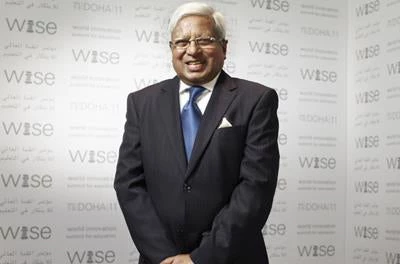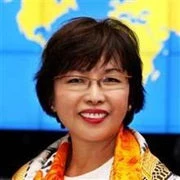
The prize was announced last year by the Qatar Foundation to foster innovation and link education to global issues and other fields of development. Although WISE has awarded education grants before, this is the first year of the WISE Prize for Education. The award includes $500,000 and a specially designed gold medal bearing the word "education" in over 50 languages. This Prize is meant to place education on the same level as other important fields such as science, literature, peace and economics, raising the status and stature of people working in the field.
I was lucky enough to sit next to Sir Fazle at the Summit’s opening dinner, which was held at the Museum of Islamic Art. At the time, I did not know that he had been selected as the winner of the prize and he did not give me any hint about this during our interesting conversation.
Bangladesh is the first country I worked on when I joined the World Bank and I remember visiting BRAC schools at the time. I had many questions for Sir Fazle and how he came to found BRAC, what inspired him, how he first funded it, and so on. I have to admit that I expected the founder of this groundbreaking NGO to sound and look more like a firebrand, instead of the soft-spoken man with a shy smile who told me how he founded BRAC while he was still a graduate student in the UK. He said he used all of his savings to launch BRAC and seemed amazed at how big and influential his organization had grown. He said "It doesn't take much to do good, and I thought I could always raise the money again."
I couldn't resist asking Sir Fazle for a quote. He gave me the following: "In my 40 years of work empowering the poor, there's no tool more powerful than education and no greater catalyst to bring about positive change." The next day, during Sir Fazle’s acceptance speech, I heard his same compelling endorsement of education's role in improving people's lives.
A critical lesson from Sir Fazle is the promise of new ideas and the role of social entrepreneurs in promoting education reforms and better education outcomes. WISE Chairman H.E. Dr. Abdulla bin Ali Al-Thani said as much in his citation of the Laureate: "Fazle Hasan Abed's life and career embody the values of WISE. He recognized that education is a passport to social inclusion and opportunity. He discovered a successful formula, and he adapted and expanded it - first in Bangladesh and then in other countries. As a direct consequence, millions of people around the world lead healthier, happier and more productive lives. His vision, resourcefulness and determination are vital ingredients of the innovation process and he stands as an example to all of us who believe that education, more than anything else, determines the destiny of individuals and societies.”
My deep congratulations to Sir Fazel for receiving this new prestigious prize and to WISE for helping raise the visibility and importance of education around the world. We need more social entrepreneurs who see the value of education and who continue looking for ways to improve its effectiveness.


Join the Conversation